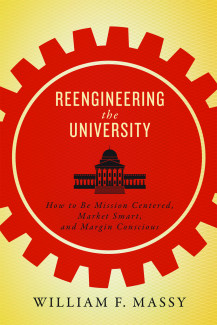
Johns Hopkins UniversityEst. 1876
America’s First Research University
Five Things University Presidents, Provosts, CFOs, Dean's, Department Chairs, and Faculty Need to Keep in Mind During the Coming Academic Year

1. Be mindful that your goal is to educate all students enrolled in your institution.
Not just the top quartile with exceptional academic talent and the bottom quartile that may need special remediation. Traditional teaching methods don't do a good job with the broad middle, as evidenced by the difficulty too many college graduates evidence in critical thinking on the job and about charged political issues like climate science and policies about unlikely but possibly catastrophic events. Redesigned courses that use learning science and technology-assisted instruction to achieve well-articulated teaching goals do a much better job of engaging all students.
2. Be mindful that managing the cost of teaching is as much the responsibility of faculty as it is of administrators.
Professors are the only people who have the knowledge needed to redesign courses. They are very conscious about quality but tend to view the cost of education as someone else's problem. This perpetuates the long-term cost increases that bedevil universities and their stakeholders. Faculty need detailed information about the courses they teach, so they can search for ways to save money without sacrificing quality.
3. Be mindful that the margins associated with courses and degree programs determine what departments, schools, and the University can and can't do.
For departments, courses with positive margins cross-subsidize ones that are academically important but lose money. Margin information for degrees improves decisions about expansion or contraction in the face of changing student preferences. Knowing ones' margins requires detailed information about student revenues as well as data on the cost of courses.
4. Be mindful that budget making at all levels of the university should be comprehensive in scope and sustainable in its objectives.
Decision-makers should look at restricted as well as unrestricted funds, for example, even though they can allocate only the latter. They should look ahead for three to five years and avoid creating hidden liabilities like deferred maintenance and financial "cliffs" due to the cessation of project funding. They should start now to build systems to facilitate all-funds budgeting and the ability to embed this year's budget within three-to five-year financial forecasts.
5. Be mindful that "reengineering" to achieve these goals requires concerted action by senior institutional leaders (starting with the president, the provost, and the CFO), and active support of the governing board.
The required actions won't just happen, despite the growing consensus that change is needed. It is necessary but not sufficient that the senior leaders articulate their priorities and inspire deans, chairs, faculty and others to engage with change. They also need to organize and fund projects for achieving specific reengineering goals, then follow through to make sure the goals are achieved.
There is no better time than the beginning of an academic year to resolve to proceed with these objectives, and then take the first tangible steps toward so doing.
William F. Massy, a higher education consultant, is professor emeritus of education and business administration and a former vice president and vice provost at Stanford University. The author ofHonoring the Trust: Quality and Cost Containment in Higher Education, he is the former president of the Jackson Hole Higher Education Group. His latest book is Reengineering the University:How to Be Mission Centered, Market Smart, and Margin Conscious.
The start of a new school year is upon us, and our authors have taken to the blog to discuss the past, present, and future of the education landscape in the United States and abroad. From administrative imperatives, to advice for parents, to student mental wellness, our authors will examine education from every angle. Check back with us for more from our JHU Press back-to-school series.


